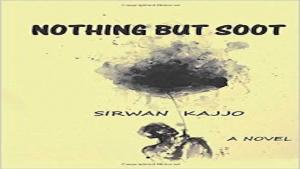
A quest for identity from Amude to America…by Sirwan Kajjo

Released in October, Nothing but Soot is Sirwan Kajjo’s debut novel. He is a Syrian Kurd based in Washington DC. Kajjo, like his main character, Kawa, has a journalist background and this is his first creative work. It is one of the few Kurdish novels written in English.
Nothing but Soot is an entertaining coming-of-age novel that follows the story of Kawa as he grows up in the persecuted streets of Amude, drops out of high school and moves to Beirut, eventually embarking on a journey to America.
Kawa starts his job as a reporter in Beirut where he enjoys a relatively free lifestyle. But his Kurdishness and Syrian citizenship are double-edged swords in the complicated Lebanese capital. Depending on which political group he comes face to face with, his identity can save him or get him into trouble.
Kawa, who is not given a last name in the book, eventually leaves Beirut in his early twenties after he is arrested and beaten by one of the sub-branches of Hezbollah.
As a political refugee in Washington DC, alone in an unfamiliar world with only a moderate grasp of English, Kawa navigates his way in building a home away from home. The duel themes of exile and home snake through the novel like golden threads.
America is also an opportunity for this young man to start exploring his sexuality, a part of his identity that along with his ethnic identity is suppressed in the country of his birth.
Kawa is a complicated character and full of contradictions that make him compelling and multi-dimensional. He is observant yet naïve, at times simple and yet unpredictable, funny, feisty, and brutally honest about his desires as well as his trivial dishonesties. He does not shy away from sharing with the reader how he urinated in a mosque when he was a young boy in Amude, or how he felt “important” when he received mail in America.
Kawa makes insightful comments about Kurdish identity as well. “Each individual in this world has a country inside which they live; only the Kurds have a country that lives inside them.”
He effectively recounts the struggles that Syrian Kurds go through: poverty, the fear of secret police, criminalization of their culture and identity—owning Kurdish books is punishable—the infamous Qamishlo football match that ended in protests and arrests of thousands and so on.
Kawa also refers to the arbitrary 1962 law that rendered hundreds of thousands of Syrian Kurds stateless. The Syrian government decided to strip many Kurds of their birth certificates under the pretext that they were Turkish Kurds. This denial of citizenship was part and parcel of the wider Arabization campaign in resource-rich Syrian Kurdistan, affectionately called Rojava.
In contrast with the detailed and sharp observations of discriminations in Syria, the America that Kawa describes is sparkly and fairy tale-like.
Immediately after arriving, he also finds sexual partners—the top priority on his list—easily find a decent office job without ever trying odd jobs, and effortlessly finds love as well. The interpretation job Kawa finds seems to be stable and well-paying—we never read about Kawa worrying about bills, for instance.
Within a few months of his arrival in Washington DC, Kawa starts a serious relationship with a perfect American lover. Dawn is a flawless beauty: educated, understanding, kind, and supportive, and who finds no language or cultural barriers communicating with the new immigrant.
The protagonist never encounters discrimination, prejudice, racism, or any form of ignorance in America. Almost everyone he meets is as friendly as they are knowledgeable.
Nonetheless, Kawa has a lot to learn when his relationship enters a new stage; his homesickness and identity crisis suddenly take a new twist as he has to make quick, critical decisions.
At times, readers will find this novel funny and amusing, and will learn how Kawa maneuvers through obstacles and if he maintains the good luck bestowed upon him in the United States.
kurdistan24
- 3955 reads


